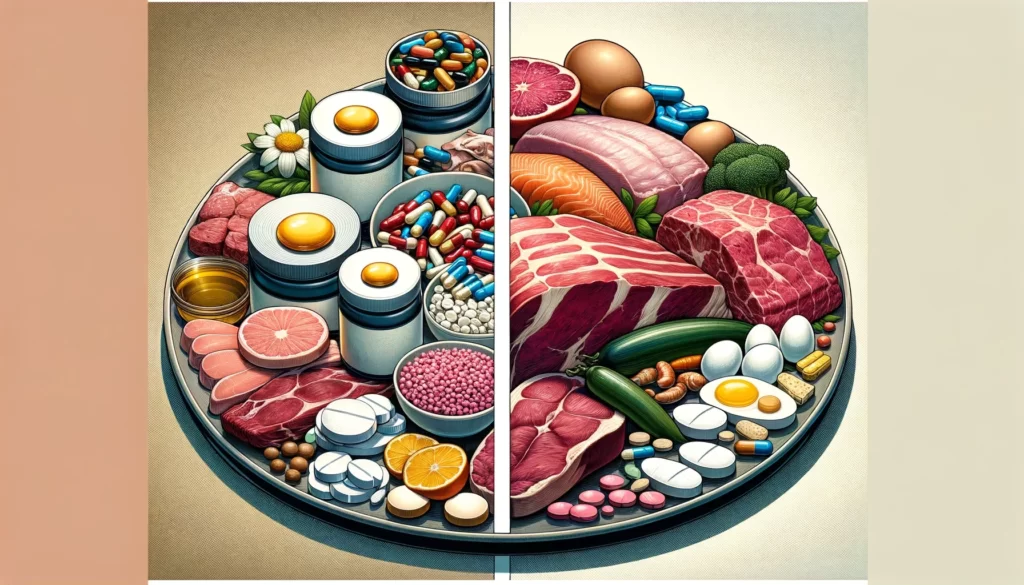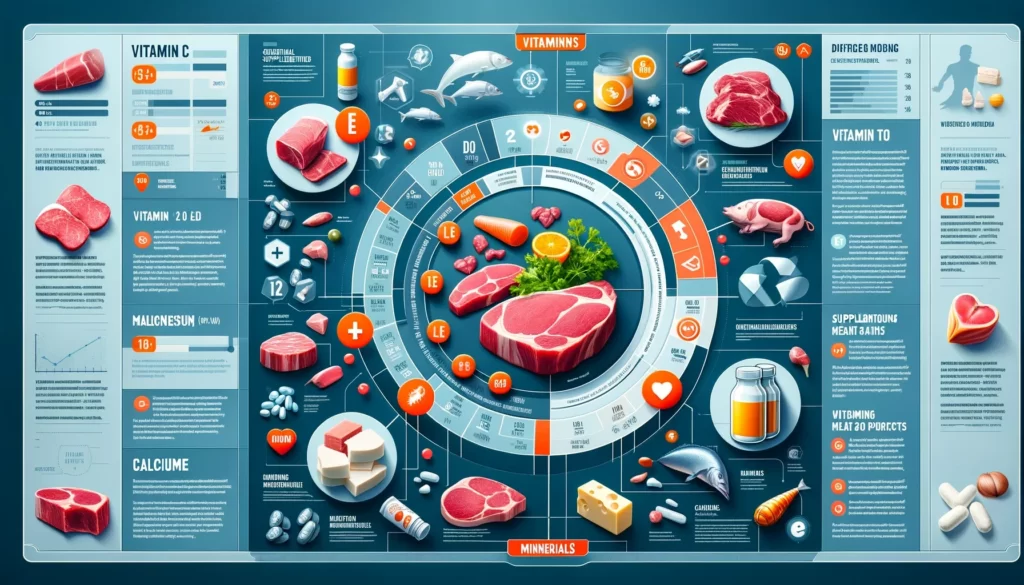
Table of Contents
Introduction
The Carnivore Diet, characterized by its exclusive focus on animal products, has gained significant attention in recent years. This high-protein, low-carb diet, while providing ample amounts of certain nutrients, may lack some essential vitamins and minerals, making the role of multivitamins crucial. In this guide, we’ll delve into the importance of multivitamins for those on a carnivore diet, helping you make informed choices for optimal health.
Understanding the Carnivore Diet: A Brief Overview
The Carnivore Diet consists solely of animal products like meat, fish, eggs, and some dairy. Excluding plant-based foods, it’s a radical approach to nutrition, attracting followers for reasons ranging from weight loss to chronic disease management.
While the diet is rich in protein and certain nutrients, it may lack essential vitamins and minerals typically found in plant-based foods. Multivitamins can help bridge this gap, ensuring a well-rounded nutritional profile.
Criteria for Choosing the Best Multivitamins

When selecting a multivitamin for the carnivore diet, consider factors like ingredient quality, the balance of vitamins and minerals, the presence of any additives or allergens, and the specific needs based on age, gender, and activity level.
Core Vitamins and Minerals: Key vitamins often lacking in the carnivore diet include Vitamin C, E, and certain B vitamins. Essential minerals to look out for include magnesium, calcium, and potassium.
Essential Vitamins for Carnivores: Vitamin C, known for its role in immune function and collagen synthesis, is typically found in fruits and vegetables. Vitamin E, an antioxidant, and B vitamins, crucial for energy metabolism, are also important.
Key Minerals in the Carnivore Diet: Minerals like magnesium, involved in numerous biochemical reactions, calcium, essential for bone health, and potassium, necessary for heart function and muscle contractions, need special attention.
Balancing Micronutrients: It’s essential to balance micronutrient intake to prevent both deficiencies and toxic overloads. This balance is especially crucial for fat-soluble vitamins like A, D, E, and K, which can accumulate in the body.
Specific Needs and Considerations
- Age-Specific Recommendations: Tailoring to Life Stages: Different life stages have varying nutritional needs. For example, older adults may require more Vitamin D and calcium for bone health, while children might need more iron and Vitamin A for growth and development.
- Gender Differences: Men vs Women’s Nutritional Needs on Carnivore Diet: Men and women have different nutritional requirements. Women, for instance, might need more iron due to menstruation, while men might require more zinc.
- Special Considerations for Athletes and High-Activity Individuals: Athletes on a carnivore diet may need higher amounts of certain nutrients like protein, B vitamins, and iron to support energy metabolism and recovery.
Product Analysis: Top Multivitamin Brands for Carnivores
- Performance Lab Whole-Food Multivitamin: This high-quality multivitamin is suitable for both high-carb and carnivore diets. It offers a natural source of vitamin C for immune health and is a good source of zinc and selenium for hormone balance. Available in formulas for men and women, it scores highly in quality (5.0), price (4.9), and taste (4.8). The ingredients are not sourced from animal products, which might be a concern for strict carnivores.
- Transparent Labs Proteinseries Collagen: This product is ideal for those avoiding artificial ingredients. It provides 11 grams of beef-sourced collagen per serving but is not from grass-fed beef. It’s praised for its quality (5.0), taste (4.8), and price (4.8).
- LMNT Recharge Electrolyte Hydration Powder: Essential for transitioning to a meat diet, it contains sodium, magnesium, and potassium. This electrolyte powder is sugar and gluten-free, available in three flavors, and scores 5.0 in quality, 4.7 in taste, and 4.7 in price.
- Kettle and Fire Beef Bone Broth: Made from 100% pasture-raised grass-fed beef, this broth is a convenient, keto-friendly snack. It’s great for quick nutrition but can be expensive if consumed frequently.
- Ancestral Supplements Grass Fed Beef Organs: These capsules contain beef liver, heart, kidney, pancreas, and spleen, providing a rich source of vitamins B, D, A, and E. It’s ideal for those who don’t prefer the taste of organ meat but want its nutritional benefits.
- Ancestral Supplements Colostrum: Known for improving gut health and immune function, this supplement is sourced from pasture-raised cattle and contains a variety of vitamins, minerals, enzymes, and amino acids.
- Omega-3 Wild Alaskan Fish Oil: This fish oil supplement, sourced from wild-caught Alaskan Pollock, is gluten-free and does not leave a bad aftertaste. It’s not necessary if you’re already consuming fresh fatty fish or fish eggs regularly.
For the carnivore diet, the focus on specific supplements like these helps in balancing the diet by providing essential nutrients that might be lacking in meat alone. Each of these products addresses different nutritional gaps and preferences, offering a comprehensive approach to maintaining health while following a carnivore dietary pattern.
Usage and Dosage
- Recommended Dosages: Dosages vary depending on the type of multivitamin. For example, Antioxidant Multiple Vitamins (A,D,E,K-intensive) and Minerals oral capsule: 2 capsules orally once daily; Vitamin B Complex with C, Folic Acid, Iron and Zinc oral tablet: 1 tablet orally once daily; Vitamin B Complex with D, Calcium and Folic Acid oral wafer: 1 wafer chewed twice daily [9].
Timing and Frequency
- Maximizing Absorption: Water-soluble vitamins like Vitamin C and B12 should be taken on an empty stomach. Fat-soluble vitamins (A, D, E, K) require fat for absorption and should be taken with food. Multivitamins, containing both types, are best taken with food to aid absorption.
Interactions with Carnivore Diet Foods
- The Carnivore Diet, primarily consisting of animal proteins and excluding fruits and vegetables, lacks certain vitamins and minerals like Vitamin C, E, and fiber. Supplements can be beneficial to avoid deficiencies. However, the lack of alkaline vegetables in this diet can affect the balance of acidity and alkalinity in the body.
Health Benefits and Risks
- Health Benefits: Multivitamins can help prevent deficiencies, especially in those who do not take supplements. They are necessary for healthy vision, immunity, heart health, and bone health [40].
- Potential Risks and Side Effects: Multivitamins do not reduce the risk for heart disease, cancer, cognitive decline, or early death. High doses of certain vitamins like E and beta-carotene can be harmful.
Addressing Common Myths and Misconceptions
- Common myths include the belief that a healthy diet eliminates the need for supplements, that missing a day requires doubling the dose the next day, and that all multivitamins are the same. These are all misconceptions; supplements can fill nutritional gaps, doubling doses is not necessary, and multivitamins vary significantly in their nutrient content.
User Experiences and Expert Opinions
- Real User Reviews: Reviews are mixed, with some users reporting significant benefits in terms of energy and wellness, while others have experienced no effect or negative side effects like allergic reactions or gastrointestinal issues [multivitamin user reviews on Drugs.com].
- Expert Insights: Nutritionists and dieticians generally recommend getting nutrients from a balanced diet, reserving supplements for specific deficiencies or populations (like women of child-bearing age needing folic acid).
Conclusion
It’s important to make an informed decision about multivitamin use, considering individual dietary needs and health conditions. Supplements should not replace a balanced diet. With growing interest in specialized diets like the Carnivore Diet, there may be a trend towards developing supplements tailored to the specific nutritional gaps of such diets.


